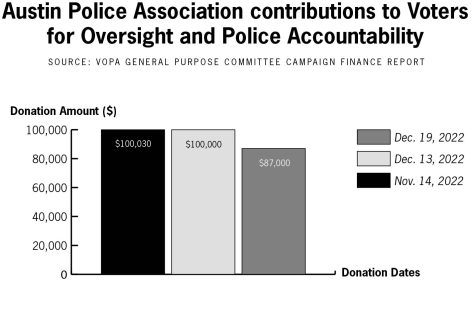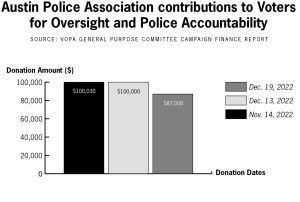Austin City Council passes ordinance to secure police pay after Austin Police Association refuses to negotiate a contract extension
February 24, 2023
The Austin City Council voted on Thursday to put in place a one-year ordinance that maintains steady police officer wages and benefits, resulting from the Austin Police Association’s refusal to negotiate a one-year contract over a four-year one.
Former city manager Spencer Cronk originally introduced a four-year contract with the Austin Police Association on Feb. 9, but it was rejected by the council, which instead opted to offer a one-year extension to the current contract. Council member Zo Qadri said the council rejected Cronk’s contract because it would prevent the Austin Police Oversight Act from being implemented if Austinites vote in favor of it in the May election.
“It’s important to do right by our first responders — fire, EMS, police,” Qadri said. “But it’s also extremely important to have civilian oversight and accountability. I think that’s been lacking here.”
Voters will decide on two propositions concerning police oversight in May. Proposition A, the Police Oversight Act introduced by Equity Action, provides a strengthened framework for the Office of Police Oversight. Proposition B, funded by the Austin Police Association, has very similar language to proposition A, but would instead limit the functions of the Office of Police Oversight, Qadri said.
“I’m of the belief that (the Equity Action proposition) does have teeth, and we can get accountability and transparency and oversight,” Quadri said. “My hope would be that voters are informed enough to vote for the actual prop that would give us accountability and oversight and not the not-good prop.”
At the special council session on Feb. 15, Austin Police Association president Thomas Villarreal said negotiating a one-year deal was not an option until a concurrent resolution for a four-year contract was introduced.
During the Feb. 15 meeting, residents against the four-year contract said it would ignore the voter’s will and the May election’s outcome. Chris Harris, Equity Action board president and Austin Justice Coalition director of policy, said a four-year contract would prevent the Austin Police Oversight Act implementation for at least four years.
“Citizen-initiated ballot measures are only fixed in that after two years, city council can make changes,” Harris said. “Moving forward with a four-year proposal was anti-democratic, and it was something that could not be allowed to happen if we’re going to actually care about hearing from the voters about police oversight.”
Harris said under the current oversight system, if the police chief chooses not to discipline officer misconduct, that misconduct does not have to be disclosed to the public. The Equity Action proposition would change this policy. Harris said disclosing all misconduct, disciplined or not, improves transparency.
“It really is a nefarious system that contributes to more misconduct and brutality because there’s this ability to keep things secret, which incentivizes a lack of discipline,” Harris said. “If there is a history of misconduct, a serious history of complaints being filed and none of those complaints are resulting in any form of discipline, it’s important that the community knows about that — that our civilian oversight system knows about that.”
After two APD officers were involved in the fatal shooting of Alex Gonzales Jr. in 2021, Harris said both officers remained on the force despite the Office of Police Oversight’s recommendations, as the chief of police decided against disciplinary action.
“Because of how transparency laws work, the family will never know why that decision was made,” Harris said. “They’ll never have access to what sort of investigation took place, and what ultimately led to the chief’s decision about that. … It’s not right.”









